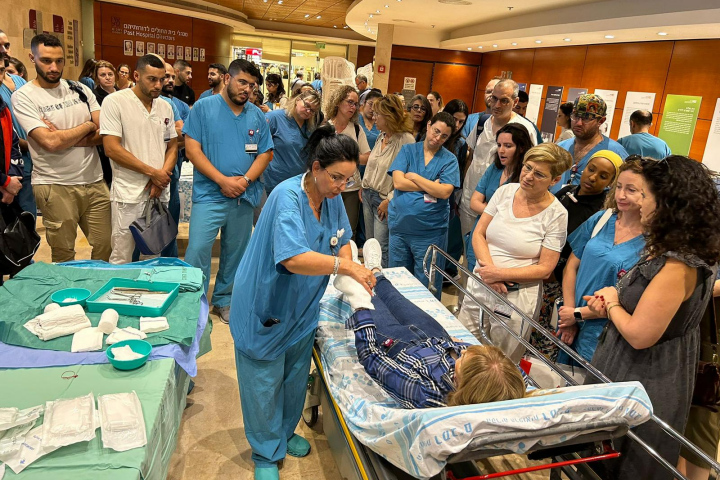Should the conflict on Israel’s northern border escalate, Rambam Health Care Campus (Rambam) in Haifa, Israel, the only level-one trauma center in the region, could see an unprecedented number of trauma patients. Nurses from every hospital department will need to cope with a continuous flow of hundreds of new patients. Ongoing training sessions are equipping our nurses and volunteers with these specialized skills.
 Mass casualty training at Rambam. Photography: Rambam HCC
Mass casualty training at Rambam. Photography: Rambam HCC
In recent weeks, hundreds of Rambam’s nursing staff have undergone advanced training to enhance their skills in treating trauma patients. This training program encompasses diverse approaches across various platforms. The purpose of this initiative is to prepare nursing staff for an escalation of conflict on Israel’s northern border, similar to the events of October 7 in the south and the ones that followed, and for activating Rambam’s Fortified Underground Emergency Hospital (FUEH) as the primary emergency medical facility in the region. In such an emergency and mass casualty situation (MCS), the hospital will receive hundreds of wounded individuals from the entire northern region. A large influx of trauma patients will arrive at Rambam simultaneously, and a coordinated effort and high level of expertise from hospital staff will be required to seamlessly integrate and treat these patients.
“From the outset of the current war, we initiated various training sessions for our nursing staff,” explains Gila Hyams, director of Nursing at Rambam, and director of The Teaching Center for Trauma, Emergency and MCS.“We understood that a similar scenario could erupt on the northern front, and this mobilized us to enlarge our capacity to treat trauma patients with a wide range of injuries. If necessary, nurses will be drawn from various hospital departments, including internal medicine, maternity, oncology, and others. However, unlike trauma or surgical nurses, these nurses have different skills -- just as an ophthalmologist and orthopedist are experienced in different medical disciplines. The training and enrichment sessions of recent weeks help Rambam advance this important task.”
The training comprises of practical sessions, workshops, demonstrations, simulations, and online sessions. Hundreds of Rambam nurses have already been trained, and we continue to increase this number wherever possible. In addition, the hospital is teaching dozens of volunteers from the medical- and other fields, who will provide real-time support should a mass casualty situation develop. Amongst other emergency requirements, additional operating rooms will be needed to cope with mass injuries.
“Unfortunately, the events of October 7 were a game-changer,” adds Professor Michael Halberthal, Director General of Rambam and chairman of Rambam’s Teaching Center for Trauma, Emergency, and MCS. “Previously we spoke about the FUEH as a facility that will serve the residents of Northern Israel during emergencies or while under fire.
It will also be a facility providing regular medical services including; oncological treatments, nephrology services, pediatrics, and gynecological care – we are now talking about a large or even unprecedented scale for treating the wounded concurrently. Training personnel for such a scenario is an integral part of such an event. We are using this time to prepare ourselves for this and situations that we never previously imagined but now, have unfortunately become a reality.”

Trauma and Mass Casualty Training at Rambam.
Photography: Rambam HCC

